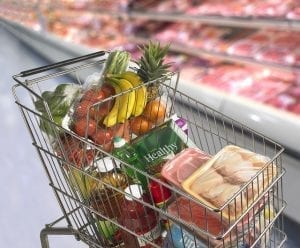Eating foods rich in magnesium helps reduce the risk of preterm childbirth and helps your baby’s nervous system develop.
Pregnancy is an important time for many women. However, this process boosts various hormonal changes that may lead to unpleasant consequences. It is important to understand that a pregnant woman requires more attention and care.
Maintaining a healthy diet and consuming enough vitamins and nutrients can help a pregnant woman avoid certain medical conditions. Moreover, a healthy lifestyle, regular visits to the gynecologist, and good mood are essential for happy and successful pregnancy. In this article, we gathered nine beneficial foods to eat during pregnancy.
1. Salmon
Despite the fact that salmon is a quite tasty fish, it is an excellent source of omega-3 fatty acids and protein at the same time. Moreover, it is beneficial to both women and a baby. There is no reason to pre-order different kits and tools to give your baby a brain-boost. You simply need to include salmon in your diet for the next nine months.
The omega-3 fatty acids (also known as DHA and EPA) in fish help the baby’s brain develop. Moreover, high levels of DHA in newborns are even associated with higher IQ, improved motor skills, and fewer neurological problems in the future. The omega-3 fatty acids are also good for the baby’s eye development. Salmon is also an excellent source of lean protein for expectant mothers.
If you are worried about seafood, you should know that salmon is low in mercury and considered safe for expectant mothers. However, it is better to limit salmon intake to two to three servings of four ounces or less each week in order to stay on the safe side. If you don’t want to eat fish for some reason, you can choose walnuts and almonds as a healthy and beneficial snack.
2. Eggs
Eggs are considered one of the most significant sources of protein. You can have them fried, scrambled, hard-boiled or served as an omelet. They are relatively cheap, versatile, and convenient. Moreover, they contain a sufficient amount of folate, iron, and choline.
You should know that choline is important for fetal brain development. It also decreases the risk of neural tube defects like spina bifida. But in order to take advantage, you have to eat the whole egg, because choline is found in the yolk (so forget about ordering only egg whites). You can also increase the beneficial effect by buying eggs fortified with omega-3 fatty acids.
3. Sweet potatoes
If you think that sweet potatoes are only for Thanksgiving, it’s high time to change your mind. Sweet potatoes are rich in nutritious fiber, vitamin B6, potassium, vitamin C, iron, copper, and beta-carotene.

Despite the fact that there are other products on our list that contain many of the same nutrients, sweet potatoes are a great source of beta-carotene. It is an antioxidant that turns into vitamin A that is necessary for both an expectant mother and a baby. Vitamin A plays an important role in the development of the baby’s eyes, bones, and skin. Moreover, sweet potatoes are also a great way to intake the essential amount of iron. They also contain copper, a mineral that helps your body absorb iron. You can cook sweet potatoes any way you like, they are great mashed, baked, and French-fried.
4. Nuts
Nuts are a crispy and convenient snack that is full of healthy fats (including those omega-3s that stimulate the brain), proteins, fiber, as well as various vitamins and minerals. In addition, consuming nuts will help make a dent in the 350 milligrams of magnesium that you should get now when you are pregnant.
Eating foods rich in magnesium helps reduce the risk of preterm childbirth and helps your baby’s nervous system develop. A cup of chopped almonds contains about 250 mg of magnesium, so keep a stash in your bag for a convenient and beneficial snack. One more useful tip, if you constantly feel hungry, you can try to eat a few pistachios with shells. Despite the fact that they contain slightly less magnesium (150 mg per cup), you will eat pistachios for a longer period of time and your body will have more time to register that it is full.
5. Beans and lentils
If you rarely eat meat or don’t eat it at all, beans and lentils can become great sources of protein and iron, as well as folic acid, fiber, and calcium for you. Moreover, baked beans are extremely rich in zinc
Beans contain many minerals that are beneficial to both the baby and expectant mother. Most of them are found in animal products as well, so beans are a great option for vegetarian and vegan pregnant women. Beans also contain a lot of zinc, an indispensable mineral that is associated with a lower risk of premature birth, low birth weight, and prolonged childbirth. If beans are bothering your stomach, you can try other major sources of zinc like meat, chicken, milk, fortified cereals, cashews, peas, crabs, and oysters.
6. Lean meat
Lean meat is an excellent source of protein, but you need to know that lean beef and pork contain iron and B vitamins as well. Your body needs more protein (about 25 grams per day) to help your baby grow and be sure that his or her muscles develop properly. The same goes for iron, a lack of this mineral can affect the growth of the baby, and enhance the risk of premature birth and low birth weight. Iron is also beneficial for an expectant mother because it is essential for the formation of red blood cells that help prevent anemia. During pregnancy, blood volume increases, so you need to increase your iron intake (up to 27 mg per day) as well.
It is also important to know that meat delivers a significant amount of Vitamin B6, which helps the baby’s tissue and brain growth. Moreover, Vitamin B6 is able to alleviate morning sickness, and B12 helps maintain healthy nerves and red blood cells.
7. Yogurt
It may be a surprise for you, but plain yogurt contains a bit more calcium than milk and contains necessary bone-building nutrients like protein, B vitamins, and zinc. Calcium is crucial for maintaining bones and teeth and helps your baby develop them. You should understand that a lack of this important nutrient can put you both at risk. Expectant mothers should receive 1,000 mg of calcium per day in order to reduce the risk of low birth weight and premature birth. If your calcium level is insufficient, your body will take calcium from your bones, which will further raise your risk of osteoporosis.
8. Oatmeal
Oatmeal is rich in fiber, protein and vitamin B6. That’s why it is beneficial to have a nice big bowl of oatmeal in the morning. Whole grains can help maintain your energy level, especially if morning sickness makes you feel a little exhausted. In addition, all of these fibers will help with constipation, which is considered a common problem during pregnancy. Moreover, oatmeal contains protein and vitamin B6, which are important for the development of the baby. You can also choose oatmeal that is fortified with iron, B vitamins, and folic acid.
9. Leafy greens
Saturated with antioxidants and nutrients, dark green vegetables such as spinach, asparagus, broccoli, and kale should be in the diet of every pregnant woman. Leafy greens are important for both expectant mothers and developing babies. In addition to antioxidants, leafy greens are rich in calcium, potassium, fiber, folate, and vitamin A. However, if you are not fond of asparagus or spinach, you can consume oranges that also contain vitamin A.


Join the conversation!